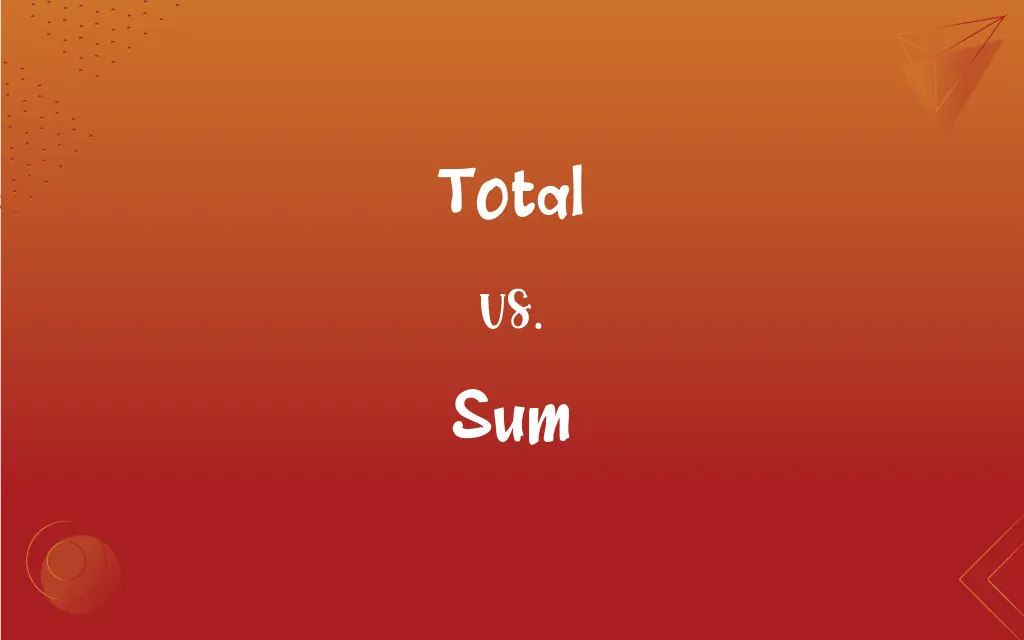Total vs. Sum: What's the Difference?
Edited by Harlon Moss || By Janet White || Updated on September 26, 2023
Total is the whole amount, and sum is the result of adding two or more numbers together.

Key Differences
Total and sum are mathematical terms often used interchangeably, but they have subtle differences in usage. Total usually refers to the whole amount or quantity in a set or group, considering all components. It is often used as a noun or an adjective, describing a complete aggregate. Sum, on the other hand, typically signifies the result or outcome of adding together two or more numbers, predominantly serving as a noun, and is especially associated with arithmetic operations.
Total is a versatile word, often used to convey the entire amount or quantity when considering every component or aspect. It may pertain to the aggregate of various elements, presenting a comprehensive view. Sum is more specialized, often used in arithmetic and mathematical contexts, indicating the process of adding together individual numbers to find the aggregate amount. It underscores the arithmetic operation, emphasizing the act of calculation.
When discussing total, it can be applied in various contexts, not strictly limited to numbers. It may refer to the overall effect, extent, or value of something, considering all parts. For instance, it can be used to describe the total impact or the total area of a region. Sum, conversely, is more bound to numerical contexts, primarily employed to describe the result of addition, focusing on the numeric outcome of the combination of individual elements.
The word total can also be employed as a verb, depicting the act of calculating the entire amount or quantity of something. In this sense, it involves determining the whole by considering every individual part. Sum, in contrast, remains primarily a noun, denoting the result of the addition process. It represents the outcome of combining numbers but does not typically portray the act of calculating.
In the broad sense, total gives a sense of completion and wholeness, spanning various contexts and scenarios, and providing a comprehensive view. It encompasses the entirety of components or elements within a set or group. Sum, while similar, has a narrower scope, strictly related to the numerical value obtained from adding individual numbers, highlighting the mathematical aspect and the resulting value.
ADVERTISEMENT
Comparison Chart
Usage
As a noun, adjective, or a verb, to depict whole amount or the act of calculating the whole amount.
Primarily as a noun, to depict the result of addition.
Context
Various contexts, not strictly numerical. Can depict overall effect, extent, or value.
Mostly numerical, representing the result of adding individual numbers.
Scope
Broad, conveying the entire amount, quantity, effect, or value considering all components.
Narrower, specifically related to the numerical result of addition.
Formality
Can be used both formally and informally.
More formal, mostly used in mathematical or financial contexts.
Function
Can represent the aggregate of various elements or the act of determining the whole.
Represents the result of the arithmetic process of addition.
ADVERTISEMENT
Total and Sum Definitions
Total
Whole amount of something.
The total of the items purchased was $200.
Sum
The essence or gist of a matter.
In sum, the findings of the research were inconclusive.
Total
Complete in extent or degree.
The building suffered total destruction.
Sum
An amount obtained as a result of adding numbers.
Total
Calculating the entire amount of something.
We totalled the expenses for the trip.
Sum
An arithmetic problem
A child good at sums.
Total
Inclusive of all that is necessary.
The total cost includes tax and shipping.
Sum
The whole amount, quantity, or number; an aggregate
The sum of the team's combined experience.
Total
A final amount after addition.
The total for the grocery items was higher than expected.
Sum
An amount of money
Paid an enormous sum.
Total
An amount obtained by addition; a sum.
Sum
A summary
My view of the world, in sum.
Total
The whole amount of something; the entirety
The storm damaged the total of the housing units.
Sum
The central idea or point; the gist.
Total
Of, relating to, or constituting the whole amount; entire
The total population of the city.
Sum
(Mathematics) To add.
Total
Complete; utter; absolute
Total concentration.
A total effort.
A total fool.
Sum
To give a summary of; summarize.
Total
To determine the total of; add up
They totaled the applications at 600.
Sum
A quantity obtained by addition or aggregation.
The sum of 3 and 4 is 7.
Total
To equal a total of; amount to
The week's receipts totaled more than $90,000.
Sum
(often plural) An arithmetic computation, especially one posed to a student as an exercise (not necessarily limited to addition).
We're learning about division, and the sums are tricky.
Total
To wreck completely; demolish
The driver survived the crash but totaled the car.
Sum
A quantity of money.
A tidy sum
The sum of forty pounds
Total
To add up; amount
It totals to $25.
Sum
A summary; the principal points or thoughts when viewed together; the amount; the substance; compendium.
This is the sum of all the evidence in the case.
This is the sum and substance of his objections.
Total
An amount obtained by the addition of smaller amounts.
A total of £145 was raised by the bring-and-buy stall.
Sum
A central idea or point; gist.
Total
Sum.
The total of 4, 5 and 6 is 15.
Sum
The utmost degree.
Total
Entire; relating to the whole of something.
The total book is rubbish from start to finish.
The total number of votes cast is 3,270.
Sum
(obsolete) An old English measure of corn equal to the quarter.
Total
(used as an intensifier) Complete; absolute.
He is a total failure.
Sum
The basic unit of money in Kyrgyzstan.
Total
(mathematics) (of a function) Defined on all possible inputs.
The Ackermann function is one of the simplest and earliest examples of a total computable function that is not primitive recursive.
Sum
The basic unit of money in Uzbekistan.
Total
(transitive) To add up; to calculate the sum of.
When we totalled the takings, we always got a different figure.
Sum
A type of administrative district used in China, Mongolia, and Russia. In Mongolia, a sum is smaller than a province. In China, it is only used in Inner Mongolia, where it is equivalent to a township.
Total
To equal a total of; to amount to.
That totals seven times so far.
Sum
(transitive) To add together.
Total
To demolish; to wreck completely. (from total loss)
Honey, I’m OK, but I’ve totaled the car.
Sum
(transitive) To give a summary of.
Total
(intransitive) To amount to; to add up to.
It totals nearly a pound.
Sum
Eye dialect of some
Total
Whole; not divided; entire; full; complete; absolute; as, a total departure from the evidence; a total loss.
Sum
Eye dialect of some
Total
The whole; the whole sum or amount; as, these sums added make the grand total of five millions.
Sum
The aggregate of two or more numbers, magnitudes, quantities, or particulars; the amount or whole of any number of individuals or particulars added together; as, the sum of 5 and 7 is 12.
Take ye the sum of all the congregation.
Total
To bring to a total; also, to reach as a total; to amount to.
Sum
A quantity of money or currency; any amount, indefinitely; as, a sum of money; a small sum, or a large sum.
With a great sum obtained I this freedom.
Total
To determine the total of (a set of numbers); to add; - often used with up; as, to total up the bill.
Sum
The principal points or thoughts when viewed together; the amount; the substance; compendium; as, this is the sum of all the evidence in the case; this is the sum and substance of his objections.
Total
To damage beyond repair; - used especially of vehicles damaged in an accident; as, he skid on an ice patch and totaled his Mercedes against a tree. From total loss.
Sum
Height; completion; utmost degree.
Thus have I told thee all my state, and broughtMy story to the sum of earthly bliss.
Total
The whole amount
Sum
A problem to be solved, or an example to be wrought out.
A sum in arithmetic wherein a flaw discovered at a particular point is ipso facto fatal to the whole.
A large sheet of paper . . . covered with long sums.
Total
A quantity obtained by addition
Sum
To bring together into one whole; to collect into one amount; to cast up, as a column of figures; to ascertain the totality of; - usually with up.
The mind doth value every moment, and then the hour doth rather sum up the moments, than divide the day.
Total
Add up in number or quantity;
The bills amounted to $2,000
The bill came to $2,000
Sum
To bring or collect into a small compass; to comprise in a few words; to condense; - usually with up.
"Go to the ant, thou sluggard," in few words sums up the moral of this fable.
He sums their virtues in himself alone.
Total
Determine the sum of;
Add all the people in this town to those of the neighboring town
Sum
To have (the feathers) full grown; to furnish with complete, or full-grown, plumage.
But feathered soon and fledgeThey summed their pens [wings].
Total
Constituting the full quantity or extent; complete;
An entire town devastated by an earthquake
Gave full attention
A total failure
Sum
A quantity of money;
He borrowed a large sum
The amount he had in cash was insufficient
Total
Including everything;
The overall cost
The total amount owed
Sum
A quantity obtained by addition
Total
Without conditions or limitations;
A total ban
Sum
The final aggregate;
The sum of all our troubles did not equal the misery they suffered
Total
Complete in extent or degree and in every particular;
A full game
A total eclipse
A total disaster
Sum
The choicest or most essential or most vital part of some idea or experience;
The gist of the prosecutor's argument
The heart and soul of the Republican Party
The nub of the story
Sum
The whole amount
Sum
The basic unit of money in Uzbekistan
Sum
A set containing all and only the members of two or more given sets;
Let C be the union of the sets A and B
Sum
Be a summary of;
The abstract summarizes the main ideas in the paper
Sum
Determine the sum of;
Add all the people in this town to those of the neighboring town
Sum
The result of adding two or more numbers or amounts.
The sum of 5 and 3 is 8.
Sum
A mathematical problem involving addition.
The students solved several sums in the math class.
Sum
An amount of something.
He ate a sum of five apples.
FAQs
Is the sum only related to addition?
Predominantly yes, sum is primarily used to describe the result of addition.
Can total be used as a verb?
Yes, to total can mean to calculate the total amount of something.
Is total more formal than sum?
Both have formal uses, but sum is more formal and specific, mostly used in mathematical or financial contexts.
Is total strictly a mathematical term?
No, total can be used in various contexts, not limited to mathematical ones.
Is sum used as a verb?
It's less common, but sum can be used as a verb meaning to calculate the sum or to summarize.
Can sum describe the essence of a matter?
Yes, “in sum” can be used to represent the essence or gist of a matter or argument.
Can total describe a condition of being complete in degree or extent?
Yes, total can be used to describe something that is complete in extent or degree, like total destruction.
Can total and sum be used interchangeably?
They can be used interchangeably in some contexts relating to aggregation of amounts, but total has broader applications.
Can total refer to overall effect or impact?
Yes, total can be used to describe the overall effect, extent, or value of something.
Does the sum always relate to a mathematical problem?
Mostly, but it can also refer to amounts of money or the essence of something.
Can the total represent the entirety of components within a set or group?
Yes, total can represent the entire amount or quantity, considering every component or aspect.
Is sum used to describe a large amount of money?
Yes, sum can be used to describe a quantity of money, often implying a substantial amount.
Is sum only associated with numbers?
Mostly, sum is used to describe the numeric outcome of addition, but it can also refer to the essence or gist of a matter.
Does total always refer to the result of addition?
Not necessarily. While it can refer to a final amount after addition, it can also describe the whole amount or the entire extent of something.
Can total be inclusive of all that is necessary?
Yes, total can be inclusive of all components, factors, or amounts that are necessary or relevant.
About Author
Written by
Janet WhiteJanet White has been an esteemed writer and blogger for Difference Wiki. Holding a Master's degree in Science and Medical Journalism from the prestigious Boston University, she has consistently demonstrated her expertise and passion for her field. When she's not immersed in her work, Janet relishes her time exercising, delving into a good book, and cherishing moments with friends and family.
Edited by
Harlon MossHarlon is a seasoned quality moderator and accomplished content writer for Difference Wiki. An alumnus of the prestigious University of California, he earned his degree in Computer Science. Leveraging his academic background, Harlon brings a meticulous and informed perspective to his work, ensuring content accuracy and excellence.































































